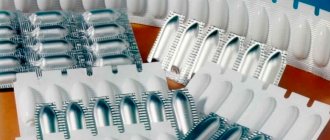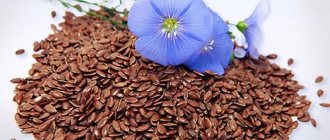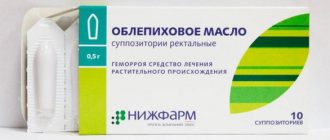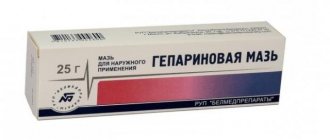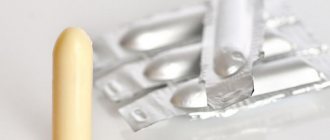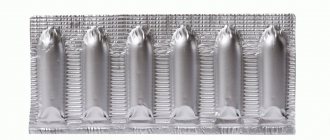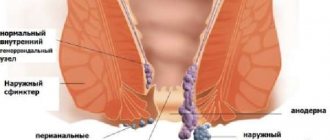The rectum functions under specific conditions, which in themselves are conducive to the development of various diseases. The slightest damage to the integrity of the wall - and the inflammatory process has already intensified. One of the diseases that can begin in this area is proctitis or inflammation of the mucous membrane of the rectal wall. The problem gives a person a lot of discomfort and unpleasant sensations, so its treatment is not put off for a long time. You can influence the lesion in several ways; an integrated approach involves a special nutrition system and the use of medications, among which suppositories are often prescribed. In such a situation, the question arises - how effective is treatment with suppositories and can it be the only one?
- 2 When you can and cannot use rectal suppositories
- 3 Types of drugs to treat the disease
3.1 Rectal suppositories used for proctitis in the photo
Using rectal suppositories for proctitis
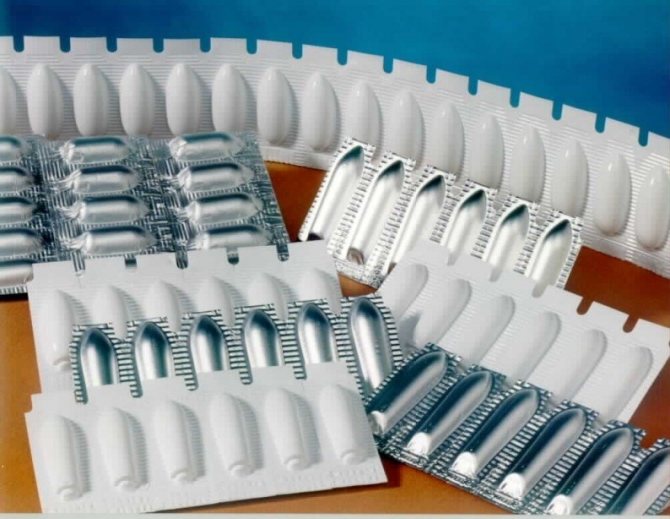
Rectal suppositories are one of the means of treating proctitis
Rectal suppositories (suppositories) are a special form of medications designed to administer the drug as close as possible to the affected area for diseases of the rectum. This is also true for those patients who, for certain reasons, cannot swallow tablets - they are unconscious or suffer from constant vomiting. The situations in which it is necessary to use suppositories are determined by the attending physician, since their too frequent and prolonged use can cause a number of unpleasant consequences.
For inflammation of the rectal mucosa, rectal suppositories can be used for several reasons. Firstly, the drug is delivered as close as possible to the source of inflammation, without passing through the aggressive environment of the digestive system, which means the effect occurs faster. Secondly, the popularity of suppositories is due to the presence of a local analgesic and anti-inflammatory effect in many of them, which effectively relieves the discomfort of proctitis.
According to doctors, the introduction of suppositories for proctitis is also fraught with danger. If there are inflammatory foci on the mucosa, it becomes even more sensitive to any mechanical influences, and if rectal agents are administered incorrectly, additional damage may occur. It is impossible to use suppositories that have a laxative effect - they irritate the mucous membrane, which only aggravates the course of proctitis.
Glucocorticoid suppositories
In severe cases and in the presence of intense symptoms, the use of hormonal suppositories may be required. Among the most active and frequently used drugs is hydrocortisone. Its use is justified in cases of severe forms of colitis, accompanied by severe hemorrhoids or the presence of hemorrhoids.
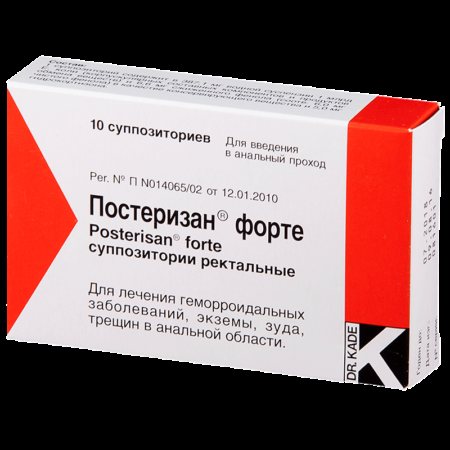
A remedy for the treatment of colitis and other diseases
When you can and cannot use rectal suppositories
The specific type of suppositories is prescribed depending on the patient’s condition, the symptoms that torment him, and the nature of the ongoing process. If there are symptoms of acute proctitis, then rectal remedies can be used only for mild forms - to relieve the manifestations of the disease and more effective treatment.
When using suppositories for severe forms of the inflammatory process, there is a high risk of additional irritation of the mucous membrane and the development of constipation. Acute proctitis in advanced form often causes thinning of the mucous layer of the rectum, therefore mechanical effects of such forms of drugs are strictly prohibited.
In case of ulcerative or necrotic forms of proctitis, rectal suppositories should also not be used - their contact with erosions can provoke bleeding.
In what cases is it not recommended to use
Medicinal suppositories have a number of contraindications for use:
- Genferon is not used if the active ingredients are particularly intolerable or if there are autoimmune disorders.
- Viferon, Hexicon are prohibited for use in case of allergies.
- Kipferon should not be used during the first trimester of pregnancy, if breastfeeding, or if you are allergic to the components.
- Acylact is prohibited in case of intolerance to the active substances or thrush.
- Bifidumbacterin should not be taken if you are sensitive, under the age of three, or while pregnant.
- Sea buckthorn is not used if you are prone to allergic reactions.
To avoid side effects, it is necessary to carefully study the instructions for the drugs. The main key to successfully getting rid of dysbiosis is eliminating the cause of this phenomenon.
The article was approved by the editors
Types of drugs to treat the disease
For an inflammatory process in the rectum, the following types of suppositories can be prescribed:
- drugs to improve tissue regeneration - they help normalize metabolic processes, speed up the restoration of the mucous membrane and minimize the symptoms of inflammation. This group includes suppositories with sea buckthorn oil or methyluracil;
- means for relieving the inflammatory process - act directly on the lesion and contribute to the rapid relief of symptoms. These drugs include Proctosan and Natalsid. In addition to anti-inflammatory properties, Proctosan suppositories have a local analgesic effect. However, it should be remembered that these suppositories cannot be used by children and pregnant women. Natalsid contains extracts of brown algae, which additionally has a wound-healing effect. Another popular remedy is ichthyol suppositories, which provide anti-inflammatory and wound-healing effects. What is especially important is that these suppositories do not have side effects, and the only contraindication for use is individual intolerance;
- antibacterial and antiviral suppositories (with chloramphenicol, metronidazole, prednisolone, etc.) - used in exceptional cases for severe forms of proctitis. To avoid possible damage to the mucous membrane, such therapy is not carried out for long, and the drugs are not administered independently, but by a specialist.
Doctor's note: in fact, all types of suppositories are dangerous in case of thinning of the mucous membrane and ulcerative processes, since they have a mechanical effect. In rare cases, when a complex course requires immediate action, this method of drug delivery is still resorted to - in such a situation it is decided that the benefit to the patient’s health will be greater than the possible harm.
Rectal suppositories used for proctitis in the photo
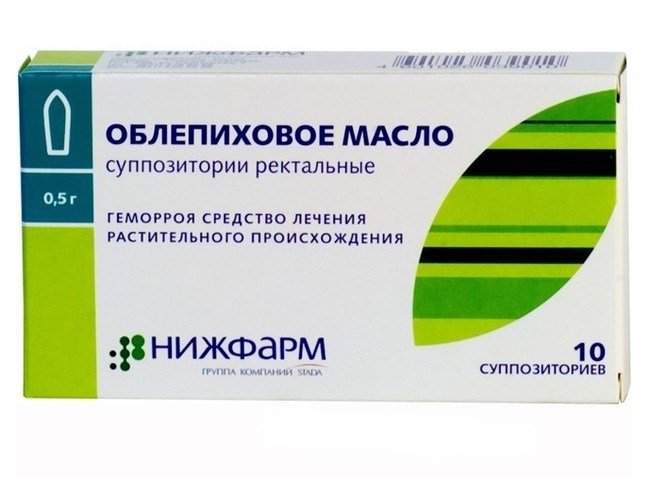
Rectal suppositories with sea buckthorn
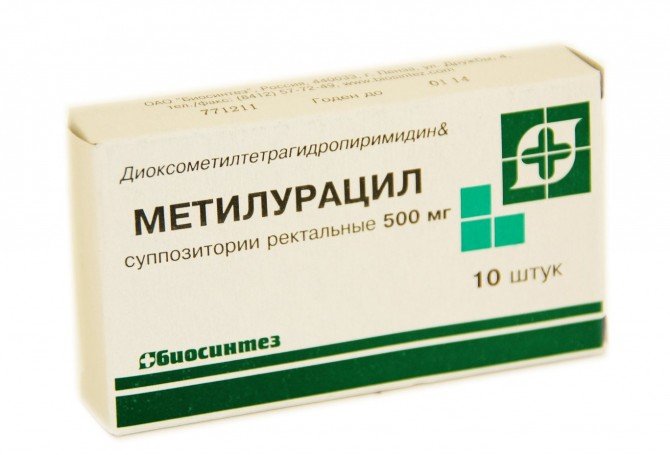
Rectal suppositories with methyluracil
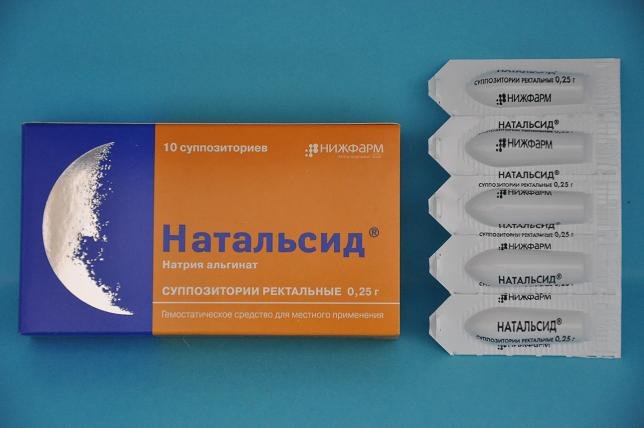
Rectal suppositories "Natalsid"
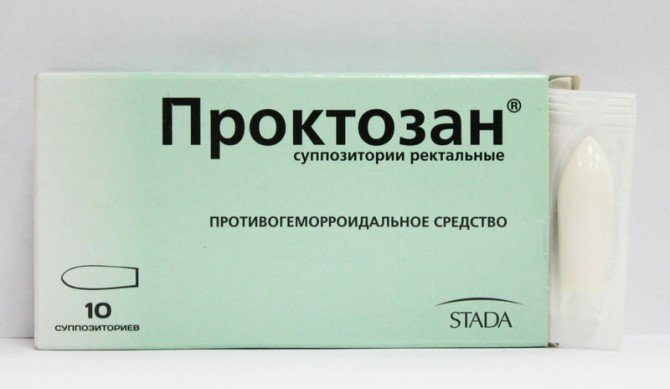
Rectal suppositories "Proktazon"
What is used for radiation proctitis
To treat the inflammatory process in the rectal area, which arose as a result of radiation exposure, the following type of rectal suppositories are widely used:
- "Proctosedyl."
The drug has bactericidal and antiseptic properties and is a local antibiotic. "Proctosedyl" is widely used to eliminate inflammation in the intestinal mucosa during proctitis and can be prescribed to combat hemorrhoids. It is recommended to use 1-2 Proctosedyl suppositories. per day after bowel movement. In severe cases, the procedure is performed by a qualified specialist, which eliminates the possibility of internal bleeding. "Proctosedyl" is not recommended for use in the presence of individual intolerance, various fungal and viral infections. Absolute contraindications are childhood, pregnancy and lactation. The drug "Proctosedyl" should be used only as prescribed by a doctor.
- "Salofalk".
Rectal suppositories are one of the expensive drugs (price - 1050 rubles). The suppositories have an anti-inflammatory effect and are based on mesalazine. The drug is widely used for the treatment of radiation proctitis after treatment of malignant tumors in the pelvic area. The use of rectal suppositories is unacceptable in cases of impaired renal and liver function, intestinal and stomach ulcers, and also during pregnancy. The course of treatment is 1-2 weeks, 1-2 pieces each. per day.
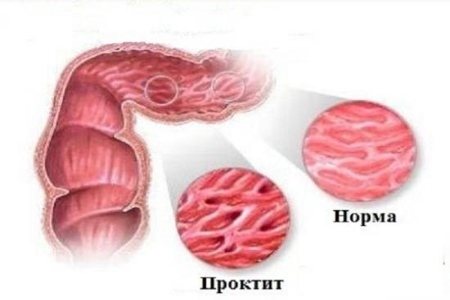
Rules of application
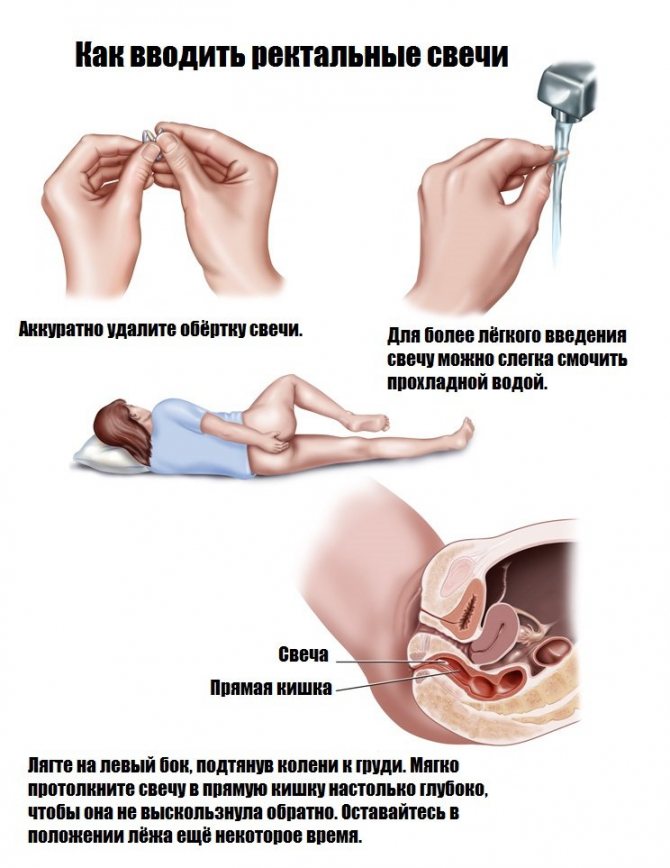
Scheme of administration of rectal suppositories
In order for the introduction of rectal suppositories to have only a positive effect, it is extremely important to carry out the process itself correctly. To avoid traumatic injuries, you must follow the following algorithm:
- You need to prepare first - cut your nails short and wash your hands thoroughly;
- A finger guard is put on the index finger of the leading hand (it can be easily purchased at any pharmacy);
- Then you should lie on your left side and pull your knees to your stomach;
- Remove the candle from the packaging. You cannot hold it in your hands for a long time - it will begin to melt, and it will become impossible to insert it;
- With your free hand, spread the buttocks and, guiding the candle with your finger, insert it, with the sharp end forward, into the anus. The product must enter completely, as if drawn in, otherwise it may come out with the next muscle tension;
- The buttocks are pressed with your hands and remain in this position for about a quarter of an hour;
- If the urge to evacuate occurs, you need to take deep breaths and lightly stroke your stomach;
- The instructions may indicate special recommendations, for example, the need to remain in a lying position for an hour after administration.
Advantages and disadvantages of use for dysbacteriosis
Stool instability indicates an intestinal disorder. If accompanying symptoms appear: pain in the abdomen, spasms in the anal area, nausea, vomiting, diarrhea, constipation, you should immediately visit a doctor. The doctor will conduct a visual examination, prescribe tests, and prescribe appropriate treatment based on the results.
All medicinal suppositories can be divided into 3 groups:
- Antibiotics are substances that have a detrimental effect on harmful bacteria in the gastrointestinal tract.
- probiotics are preparations that contain ready-made live microorganisms necessary to normalize digestive processes.
- immune stimulants (of general importance in the treatment of dysbiosis).
The advantage of rectal suppositories is ease of use for older people and children, local action that does not affect the functioning of other organs.
The disadvantage of using this type of medication is discomfort upon first administration.

Indications for the use of suppositories
Therapy for microflora disorders (dysbacteriosis) occurs in stages. The patient’s action algorithm should be aimed at:
- Suppression of pathogenic microorganisms:
- elimination of the inflammatory process;
- antimicrobial effect;
- anesthesia.
- Colonization of lesions by beneficial microorganisms.
- Consolidating the result, increasing the barrier functions of the body:
- multivitamins;
- balanced diet;
- the right way of life.
Suppositories for dysbacteriosis are used to cope with the first two tasks. Typically, this is a course of treatment lasting for a decade.
Indications for use:
- inflammatory and infectious pathologies of the urogenital tract;
- chronic cystitis of bacterial origin with relapses;
- nonspecific fungal and mixed vaginitis;
- prevention of infectious complications;
- exacerbation of ulcerative colitis of varying severity;
- remission of ulcerative colitis;
- salmonellosis;
- urinary tract infections;
- dysentery;
- chlamydia;
- colpitis;
- dysbiosis;
- hormonal colpitis.
You cannot prescribe suppositories for yourself, as it is important to take into account the characteristics of the body, contraindications, and age. Only a doctor can develop a therapeutic regimen, taking into account medical history and test results. Which suppositories are appropriate in a particular case is determined by either a gynecologist or a gastroenterologist.
Causes
There are many reasons for rectal proctitis in humans, but the most common are:
- Infectious penetration into the intestinal wall. Most often this occurs with the participation of chlamydia, herpes and E. coli. Fistulas with ulcers that appear on the walls of the intestine are tuberculosis that enters the bloodstream. In women with gonorrheal vaginitis, gonococci enter the intestine from the vagina, and what is most interesting is that infection occurs through the vaginal wall. Also, a large number of parasites that prefer to live in the intestines contribute to the development of infection there with waste products. These parasites include roundworms, helminths, tapeworms and a number of others.
- The development of an infectious disease due to injury to the colon mucosa. This often happens due to constipation, frequent diarrhea or hemorrhoids, which cause cracks in the sphincter and subsequent infection. The mucous membrane can also be damaged after the passage of an undigested hard food fragment (bone) through the rectum, the introduction of a foreign object into the anus, or after anal sex.
- An unhealthy diet with a lot of spices, hot peppers, salted and smoked foods, and alcohol in the diet leads to the appearance of a substance in the feces that irritates the mucous membrane and provokes mucus secretion in the rectum.
- Gastrointestinal diseases that cause digestive problems and subsequent constipation and diarrhea. This cannot but have a detrimental effect on the condition of the rectum. With cholecystitis, the biliary system functions worse, so the digestion of food is disrupted. The intestinal microflora suffers from gastric ulcers and gastritis, which causes indigestion and very severe pain.
- An oncological tumor that produces toxins that destroy the tissue of the rectal wall. With this disease, a person experiences unbearable pain and may die from peritonitis.
- Poisoning of the body due to treatment of a person for cancer with radiation therapy or chemotherapy. Proctitis becomes a consequence of such treatment.
- A disease of an autoimmune nature, in which the human immune system independently destroys its own mucosa, and as a result, an infectious infection of the rectum occurs.
Symptoms
Proctitis has several symptoms that make it possible to diagnose this disease in a person by conducting a survey. These symptoms are:
- A painful sensation in the rectum, intensifying at the time of defecation, is the main symptom;
- The pain penetrates the groin, the person feels it in his pelvis;
- In some cases, pain is felt in the lumbar region;
- The patient is left with the impression that a foreign object has entered his anus;
- Body temperature rises to 38 degrees;
- Discharge of blood or pus from the anus and their presence in the stool;
- The patient experiences general weakness and dizziness due to intoxication;
- Often has the urge to go to the toilet to empty the bowels;
- A disruption in the gastrointestinal tract, as a result of which constipation changes to diarrhea, and diarrhea changes to constipation.
It is important to know that acute proctitis develops very quickly. Almost all symptoms appear in just a day. That is why it is recommended to immediately seek help from a doctor if several symptoms appear. Leaving proctitis without proper and timely therapy, it will no longer be possible to avoid its transition to a chronic form. And as you know, in this form the disease manifests itself with almost all of the above symptoms, but they are sluggish and are accompanied by quite tolerable pain.
List of the best painkillers and anti-inflammatory suppositories
The main pain syndrome that develops with inflammation of the mucous membrane or denser intestinal tissue is the so-called colitis. This symptom is characterized by an acute course or aching pain, which manifests itself periodically under the influence of negative factors (poor nutrition, long intervals between meals, dysbacteriosis, bacterial or viral infection entering the gastrointestinal tract).
Anti-inflammatory suppositories contain antibiotics of one group or another, which are indicated for use in cases of bacterial invasion, when the inflammatory process in the intestinal cavity is associated with an imbalance of bacterial microflora towards pathogenic microorganisms.
Pain-relieving suppositories are necessary in order to quickly and effectively eliminate the very symptoms of pain. They perfectly relieve spasms, colic, cutting and aching pain.
In addition, anti-inflammatory suppositories have a smaller list of contraindications and side properties, which has a more beneficial effect on the digestive tract system. There is no chemical load on the liver tissue, and the gastric mucosa and pancreas do not suffer, as is usually the case during long-term use of tablet medications.
Below is a list and pharmacological characteristics of the most effective rectal suppositories with an anti-inflammatory and anesthetic spectrum of action.
Hexicon
This drug contains the active substance - chlorhexidine bigluconate. It is considered an excellent antiseptic, which is taken 1 suppository per day. It is advisable to insert the suppository into the rectal cavity at the same time. It is recommended to do this in the morning. The duration of treatment is from 7 to 10 days. It is used to combat a pathogenic infection that has penetrated the organs of the gastrointestinal tract and affected their mucous membrane, provoking a sluggish or acute inflammatory process.
The principle of action of the drug is that chlorhexidine molecules, together with the flow of the bloodstream, enter the site of the disease, are embedded inside the cell of the bacterial agent and destroy it from the inside, blocking the flow of oxygen into it. In this regard, the activity of pathogenic microflora quickly decreases, and the population of infectious agents gradually decreases to a minimum. In parallel with this, the cells of the immune system also fulfill their functional role and contribute to the accelerated cleansing of the intestines from inflammatory foci. The cost of one package of this medicine is 450 rubles.
Polygynax
The drug consists of a combined pharmacological formula, since it simultaneously contains such active components as neomycin, group B polymyxin, nystatin (an anesthetic). The optimal course of treatment is 10 - 14 days. 1 suppository is inserted into the anus in the morning and evening. The main thing is that there is a time interval of at least 12 hours between doses of the medication. This drug belongs to the aminoside antibiotic series.
Relieves inflammation of the intestinal mucosa and at the same time destroys the infection so that there is no relapse of the disease.
In retail pharmacy chains, the price of Polygynax anti-inflammatory suppositories is in the range of 280-300 rubles per package.
Meratin-combi
It has a similar composition as Polygynax suppositories, but in this case a powerful antiseptic is also added - prednisolone. The drug simultaneously eliminates the most acute pain syndrome and at that moment stops the focus of pathological inflammation. It does not matter what caused the disease and what its nature of origin is. Taken no more often than 1 time per day. The average duration of one course of treatment is 10 days.
In particularly difficult cases, it can be extended if the attending physician considers it appropriate to use this medication for a longer period. The cost of painkillers and anti-inflammatory suppositories Meratin-combi is 370 rubles per pack, which contains 10 suppositories. With positive dynamics of recovery, 1 package is enough to complete a full course of intestinal therapy.
Mikozhinaks
A complex remedy for systemic therapy of inflammatory diseases of the gastrointestinal tract and genitourinary system. Designed to relieve aching and acute pain, relieve swelling of the mucous membrane, suppress the growth of bacterial and fungal infections, which is especially important if the patient has developed colitis due to dysbiosis and the appearance of intestinal mycosis. The active components of the rectal suppository are chloramphenicol and metronidazole. The latter type of antiseptic is capable of fighting gram-positive, gram-negative microorganisms, as well as bacteria leading a parasitic and intracellular lifestyle.
Dexamethasone acts as an analgesic. It is believed that the optimal duration of one therapeutic course is 10 days. It is injected into the rectal cavity 1 or 2 times a day, depending on the severity of the current disease. It has a minimal number of medical contraindications and negative side effects. One package of Mikozhinax suppositories will cost the buyer 350-360 rubles.
Betadine
Anti-inflammatory and analgesic rectal suppositories that provide an antiseptic effect due to iodine-based compounds. It is also produced by pharmacological companies in other forms of release (antiseptic solution). The course of treatment is longer than that of suppositories with a similar spectrum of action and lasts at least 12 days. The average dosage of the drug for an adult is 1-2 suppositories in the morning and evening.
It is considered a universal anti-inflammatory and analgesic intended for intestinal therapy. In practice, it has proven its effectiveness against bacterial, viral and fungal infections that parasitize the organs of the digestive system. Well absorbed by the body of patients of all age groups .
The only disadvantage of the drug is that it is contraindicated in patients with thyroid dysfunction, the tissues of which produce a larger volume of hormones than is necessary for the normal functioning of the body.
All of the above drugs are truly among the best in their category and help not only to relieve pain from intestinal colitis, but also help get rid of a large number of gastrointestinal diseases, the nature of which is closely related to infection entering the body. Despite the fact that the specified list of rectal suppositories has a beneficial effect on the human intestines, only a gastroenterologist or proctologist who is treating the patient can prescribe their use. The selection of medication, its dosage and duration of administration are carried out.
Self-treatment is contraindicated and can cause much more serious complications.
Sulfanilamide suppositories for intestinal colitis
The microflora of the large intestine is so aggressive that minor trauma to the mucous membrane is enough for inflammation to develop. Proctologists often encounter proctitis and colitis, the most common intestinal pathology after hemorrhoids.
These diseases are treated comprehensively; an important component of therapy is the use of rectal suppositories. Suppositories for proctitis and colitis are classified as local therapy, the purpose of which includes the following:
• regeneration of damaged tissues, • reduction of pain, • relief of defecation,
• normalization of stool.
All suppositories are used only after consultation with a doctor, since the wrong choice of drug or inadequate dosage contributes to the occurrence of additional damage. This is especially true for suppositories with a laxative effect, since constant diarrhea interferes with the restoration processes in the intestinal mucosa.
Contraindications to the use of suppositories for proctitis and colitis
Despite the fact that suppositories do not have a pronounced systemic effect on proctitis and colitis, there are a number of contraindications for use:
• Severe forms of radiation damage to the intestine. Contact with a damaged mucous membrane leads to irritation of the intestinal walls, blocks peristalsis, which leads to stagnation of feces and constipation.
• Ulcerative and necrotic lesions of the intestinal mucosa. With erosive or necrotic changes in the mucosa, there is a high probability of developing intestinal bleeding, which is difficult to correct.
The working component is Mesalazine.
The drug belongs to the group of intestinal anti-inflammatory drugs. The action is caused by the suppression of neutrophil lipoxygenase and a decrease in the synthesis of inflammatory mediators. Affects the process of phagocytosis, slows down the production of immunoglobulins. Salofalk suppositories destroy free radicals, which results in an antioxidant effect.
Mesalazine has a local effect in the mucous and submucosal layer of the intestine and has good bioavailability, especially in the rectum and colon.
Indications for treatment:
Ulcerative colitis in moderate and mild severity in the acute stage.
Planned therapy of nonspecific ulcerative colitis.
Inflammation of the rectum (proctitis).
Crohn's disease, exacerbation and for the purpose of prevention.
Release form
diverse:
• tablets of 250, 500, 1000 mg, • foam for rectal use 1 g, • suppositories of 250 and 500 mg,
• suspension of 2 and 4 g.
The most popular form of administration is Salofalk candles.
Dosage: 1 suppository 250 or 500 mg 3 times a day, in severe cases the dosage may be doubled. For preventive purposes, suppositories with a minimum dosage of 250 mg are often prescribed. To enhance the therapeutic effect, simultaneous administration of the tablet and rectal forms of the drug is possible, but the maximum daily dose should not exceed 3 mg.
Skin manifestations: rash, itching, redness.
From the lungs - bronchospasm, allergic alveolitis.
From the gastrointestinal tract, dyspeptic symptoms, acute pancreatitis, hepatitis, increased liver tests (AST, ALT, bilirubin).
From the cardiovascular system - myocarditis, pericarditis.
From the nervous system - increased or decreased blood pressure, chest pain syndrome, shortness of breath, headaches, insomnia, depressed mood, polyneuropathy, convulsive syndrome, tremor.
From the hematopoietic system - changes in peripheral blood parameters, decrease in the number of platelets, leukocytes, anemia.
From the excretory and reproductive systems - interstitial nephritis, the appearance of protein in the urine, casts, red blood cells. Changes in spermogram (impaired sperm motility).
Common unwanted side effects:
• hair loss, • increased temperature response, • pain in joints and muscles, • inhibition of the lacrimal apparatus,
• acquisition of an orange tint in urine and tear fluid.
Contraindications to treatment:
• Diseases of the hematopoietic system. • Severe kidney and liver diseases in the decompensation stage. • Increased individual sensitivity to the components of the drug and salicylic acid derivatives.
• Phenylketonuria. • Peptic ulcer of the stomach and duodenum.
• Use during pregnancy (1st trimester) is possible in cases where the benefits of the drug exceed possible negative effects.
• During lactation, use with great caution as prescribed by a doctor; in case of neonatal diarrhea, stop breastfeeding.
The likelihood of side effects when using suppositories is less than when using oral forms of the drug.
In childhood, attention is paid to the form of "Salofalk", the drug is not used until 2 years of age, upon reaching 2 years of age suppositories can be prescribed, from 3 years - tablets, from 6 years - granules. Dosage up to 40 kg - 250 mg 3 times / day, above - 500 mg 3 times / day, the course of treatment is determined by the doctor in each case individually.
Before using Salofalk, it is necessary to monitor a general urine test, a general blood test, and liver enzymes. Monitoring is necessary for all chronic diseases during treatment with Salofalk, especially for kidney diseases (nephrotoxic effect) and lungs (bronchial asthma affects psychomotor reactions, which must be taken into account when driving a car or performing precise work.
List of drugs with which Salofalk is not prescribed:
• indirect anticoagulants, • glucocorticosteroids, • rifampicin, • spironolactone, • furosemide, • lactulose, • azathioprine,
• 6-mercaptopurine.
Review of Methyluracil suppositories
Methyluracil suppositories are used to normalize metabolic processes and improve trophism. The active ingredient is dioxomethyltetrahydropyrimidine, which stimulates recovery processes (regeneration) and the formation of leukocytes and red blood cells. In addition, the medicine has a positive effect on all parts of the immune system. Methyluracil is especially popular in the treatment of radiation damage to the intestine.
Source: https://tsitologiya.su/zheludok/sulfanilamidnye-svechi-pri-kolite-kishechnika
The use of suppositories for intestinal colitis, mechanism of action and contraindications
Chronic diseases of the stomach and intestines are quite common among the population. Poor nutrition, lack of essential substances, stress and a sedentary lifestyle can trigger the development of colitis. Suppositories for colitis can gently eliminate unpleasant symptoms and cure the disease.
Pros of using candles
Colitis is an inflammatory disease of the mucous membranes of the colon. Most often, middle-aged people are susceptible to the disease. The development of colitis can be provoked by a low fiber content in the diet and dysbiosis of the microflora of the gastrointestinal tract.
Colitis
Types of colitis:
- Ulcerative. The reasons for the occurrence are not fully understood,
- Infectious. Caused by pathogenic microflora (dysentery and E. coli, streptococci and staphylococci),
- Ischemic. The result of lesions of the branches of the abdominal aorta,
- Toxic. Caused by drug, chemical or radiation poisoning.
Colitis can be acute or chronic. Acute colitis is accompanied by a constant urge to defecate, rumbling, abdominal pain, and diarrhea.
Treatment of acute and chronic colitis is aimed at eliminating symptoms. Among other remedies, rectal suppositories are also prescribed, depending on individual symptoms.
Effect of suppositories for colitis:
- regeneration,
- healing,
- removal of edema,
- anesthesia,
- relief of bowel movements.
Some suppositories can be used by children, pregnant and lactating women due to the absence of dangerous components.
Anti-inflammatory drugs
The suppositories contain bufexamak, bismuth and lidocaine, due to which the drug has a pronounced anti-inflammatory, anesthetic and drying effect on the intestinal walls. Their use will be especially useful for colitis in combination with hemorrhoids.
Natural healing agent. The drug has effective antiseptic properties and suppresses pathogenic intestinal microflora in infectious colitis. The fat-soluble component is well distributed throughout the intestinal walls.
The drug contains belladonna alkaloids. Main action: pronounced analgesia, relief of spasms. In their pure form, belladonna candles are sold strictly according to the recipe. In complex products with other names, the extract is enhanced by other substances. The drugs are available without a prescription.
Prescription remedy Sea buckthorn oil is a remedy that accelerates tissue regeneration. It has this effect as part of suppositories for rectal use. Candles with rosehip oil have a similar effect.
Ichthyol has an antiseptic and irritant effect, which leads to increased blood circulation in the intestinal walls, accelerated tissue regeneration and relieve inflammation.
The active substance has strong healing properties and is widely used not only for colitis, but also for the treatment of many other diseases of the rectum and large intestine, including hemorrhoids. The line of products also includes an ointment with methyluracil with a wide range of applications.
Most of the remedies are inexpensive and can cure colitis as part of complex therapy. A proctologist or gastroenterologist will help you choose the right combination of drugs. For constipation, suppositories gently stimulate the intestines and help ease stool.
Suppositories with analgesic effects
Refers to non-steroidal anti-inflammatory drugs. It has an intense analgesic effect by blocking the production of prostaglandins in the body.
The drug is prohibited for use during pregnancy as it can cause hypoxia and delayed fetal development.
Preparations containing it have many names and are widely available in pharmacies.
Suppositories do not have strong anesthetic properties, but they effectively relieve intestinal spasms. Restrictions include concomitant use of alcohol due to the risk of an excessive drop in blood pressure.
The drug is widely used to reduce the tone of the uterus in pregnant women, so it can also be used for colitis during pregnancy.
Glucocorticoid suppositories
In severe cases and in the presence of intense symptoms, the use of hormonal suppositories may be required. Among the most active and frequently used drugs is hydrocortisone. Its use is justified in cases of severe forms of colitis, accompanied by severe hemorrhoids or the presence of hemorrhoids.
A remedy for the treatment of colitis and other diseases
A unique product is the Posterizan Forte suppositories. They include corpuscular components and metabolic products of Escherichia coli. The drug has a powerful therapeutic effect and allows you to get rid of even severe manifestations of colitis and hemorrhoids in the shortest possible time.
Escherichia coli stimulate local immunity, suppress pathogenic microflora and stimulate regeneration.
A properly selected remedy as part of a comprehensive treatment will help get rid of the unpleasant symptoms of colitis in a short time, and preventive courses, especially if you are prone to hemorrhoids, will allow you to completely forget about painful sensations.
about traditional methods of treating colitis:
Loading…
Source: https://MedBoli.ru/gemorroj/drugie-zabolevaniya/primenenie-svechej-pri-kolite-kishechnika-mehanizm-dejstviya-i-protivopokazaniya
Drugs commonly prescribed for dysbiosis
| Name of candles | Mode of application |
| Suppositories for vaginal dysbiosis | |
| Genferon | Antiviral and antibacterial suppositories, used intravaginally or rectally, twice a day (morning, evening), one suppository for a decade |
| Polygynax | Combined antibiotic, antifungal and antibacterial agent, used intravaginally, 1 capsule in the vagina, before bedtime - 12 days, for prophylactic purposes - 6 days |
| Suppositories for intestinal dysbiosis | |
| Salofalk | Suppositories with an anti-inflammatory effect, used rectally, the timing of use is prescribed by the doctor, pay attention to a large list of contraindications |
| Anuzol | Antispasmodic with anti-inflammatory, antiseptic, astringent and drying effects, used rectally 1 to 3 times a day |
| Vaginal suppositories for dysbiosis with probiotics | |
| Gynolact | Suppositories with lactic acid bacteria for dysbacteriosis, restore the balance of microflora, administered once a day, one capsule before bedtime |
| Acylact | Antimicrobial drug - live, antagonists, lactobacilli acidophilus, used intravaginally, 1 suppository twice a day |
| Suppositories for the treatment of dysbiosis with probiotics | |
| Lactonorm | Suppositories with lactobacilli acidophilus stabilize the balance of microflora, administered twice a day, 1 suppository - a week |
The best suppositories for dysbiosis are correctly selected drugs, taking into account the characteristics of a particular case, capable of restoring the balance of microflora in the shortest possible time and getting rid of annoying symptoms.

